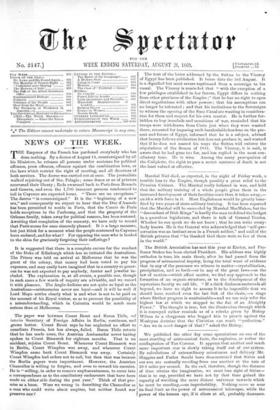The British Association has met this year at Exeter, and
Pro- fessor Stokes has been elected President. His address was highly orthodox in tone, his main thesis, after he had passed from the progress of astronomical inquiry, being the total want of evidence that in any of the processes we witness in matter—crystallization, precipitation, and so forth—or in any of the great laws—as the law of motion—which affect matter, we find any approach to the formation of an organic structure, or to the development of the mysterious faculty we call life. " If a thick darkness enshrouds all beyond, we have no right to assume it to be impossible that we should have reached even the last link of the chain,—a stage where farther progress is unattainable—and we can only refer the highest law at which we stopped to the fiat of an Almighty Power." The thought is true, but the illustration through which it is conveyed rather reminds us of a rebuke given by Bishop Wilson to a clergyman who begged him to preach against the Wesleyan doctrine that the Christian can reach "perfection." " Are we in much danger of that? " asked the Bishop.






























